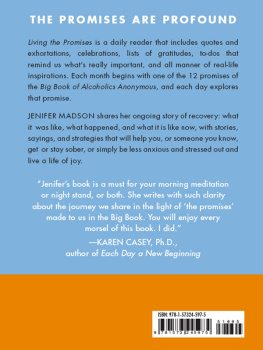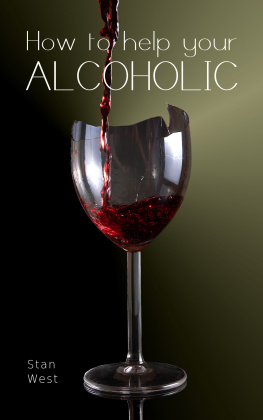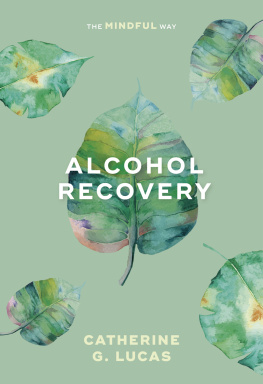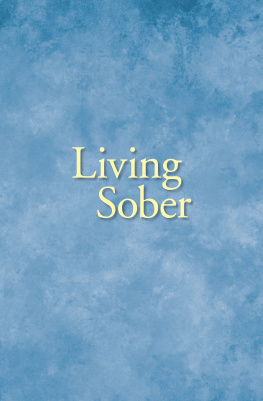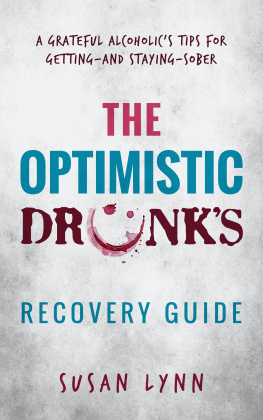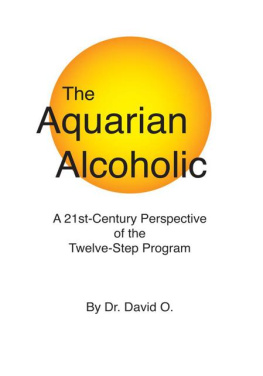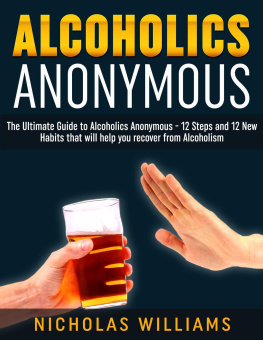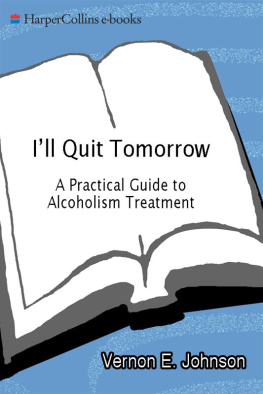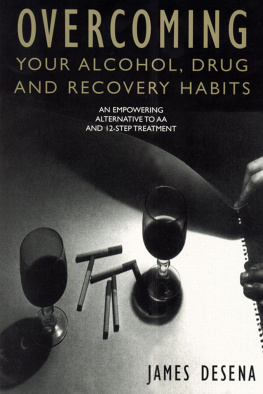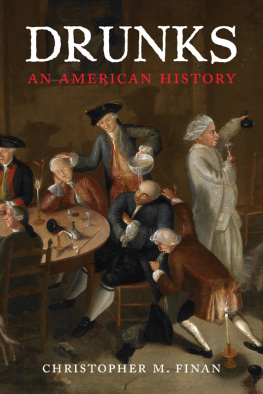Let me start off by telling you what this book is not. It is not a book written by an academic or a doctor. It doesnt have carefully drawn charts or squiggly diagrams describing a variety of personalities and behaviour patterns. I have read many of those books during my study as an addiction counsellor and although I learned a lot from them, I want this book to be different. Its going to be different, because its written by someone who had everything and who lost everything; someone who went through the living hell of chronic alcoholism and the tough times of recovery. I want the book you have in your hands to help inspire your recovery, whether you are an alcoholic or the family of an alcoholic. I want to pass on to you everything I learned on my journey.
Im a recovering alcoholic and I havent needed to drink for quite a few years. Now, I write about my experiences with alcohol, my experiences in recovery, and the knowledge I have gained as an addiction counsellor. In my work as an addiction counsellor Im still learning learning about the complex world of alcoholism. I try to avoid theory because there are plenty of excellent books in that category. I want this to be an easy to read, a practical, hands-on type of book that anyone with an interest in the subject of alcoholism can understand.
During my drinking days I let down and hurt many wonderful people my family and loved ones in particular. Alcoholism is known as the family illness and it truly is. Before alcoholism kills us it usually destroys the lives of our loved ones, the people who care about us most. Much of this book is written with these people in mind because the family is the silent victim of alcoholism.
Finally, readers of this book will notice what may appear to be some degree of repetition. This is intentional. If I return again and again to certain aspects of the illness (or co-dependency) its so readers are continually reminded of the importance of the subject in question.
(N.B. Nobody can act or speak on behalf of Alcoholics Anonymous (AA). Any views or opinions expressed by me in this book do not therefore seek to represent that wonderful fellowship.)
9 - The Journey to Recovery
Relapse is when an alcoholic stops drinking for a period of time, (it can be weeks, months or years) but then returns to a drinking pattern as bad, or worse, than before. We counsellors often meet the drinker for the first time at this stage the stage when all else has failed.
An experienced addiction counsellor will know that relapse should always be viewed as a learning process rather than a disaster. Relapse happens, usually in the early days, to many alcoholics.
The one thing the recently relapsed alcoholic can be assured of, is that no counsellor will be judgmental about the relapse itself. Handled correctly it can be a great learning experience for the alcoholic and the counsellor. Understanding the triggers to the relapse are key to future recovery.
The early days of being dry are an extremely stressful period for the recovering alcoholic. The family of the alcoholic often has high hopes and expectations of recovery and this can cause huge anxiety for the alcoholic. The alcoholic worries about what will happen if they drink again, because by this point they have usually received the family yellow card, i.e. One more drunken incident and youre out. The inner turmoil in the mind of the recovering alcoholic is often so bad that they take a drink just to cope with the stress of it all. Truly a vicious circle!
A great many studies have been done in the area of relapse. Low self-esteem is a factor identified in many such reports. Alcoholics, for all their bravado and bluff, secretly loathe themselves. In early recovery they can have very negative perceptions of themselves. This lack of belief in themselves can often create a self-fulfilling prophesy of doom, which can lead to an eventual relapse. I referred to this earlier as white knuckle sobriety. It rarely lasts and its the total opposite to the structured, caring recovery programmes offered by AA, treatment centres and addiction counsellors. Those of us who have tried it this way know only too well the pain that failing the, I can do it on my own, approach can cause. We also remember just how naked a newly-dry alcoholic feels no warm blanket of alcohol to protect them from the harsh wind of lifes ups and downs.
Powerful and long lasting healing can be done with an alcoholic who is willing and able to discuss what went wrong prior to the relapse. This learning can provide invaluable lessons as to how the recovering alcoholic needs to change their way of living and relating to others around them. But be warned folks, this cannot be done alone. If you find yourself identifying with the above you need to do one thing right now ask for help! You have nothing to lose and a lot to gain.
The dangers of complacency
Even for professionals who work in the field of addiction, the learning curve never ends. Many of us are ourselves recovering alcoholics ourselves, which helps us better understand the mind of the addictive personality, a mind that to the rest of the world defies logic. When the alcoholic is drinking they are influenced by alcoholic logic and that, unfortunately, is rarely understood by the rest of the world. This alcoholics logic, usually whispered into their ear by Jasper, can create all kinds of problems for them if they dont recognise his voice.
Every day you dont take a drink or take a mood-altering substance you get stronger. But, the greatest threat recovering alcoholics face is that every day they get stronger, Jasper tries to slip into their mind one simple feeling that has a powerful, destabilising effect complacency.
The better we do in recovery the more we are inclined to take our sobriety for granted. Recently, I was talking to a man I have enormous respect for in his recovery. He said that after seventeen years he drank again. I asked him what the trigger was. His answer was simple: I just wanted to see if I could drink and control it. Jasper persuaded him to try one vodka on the way home from work. He drank it no problem and went home. Next night he did the same, no problem. But over ten days he progressed to three drinks per night. A month later he went on a bender and didnt come home for three days.
His distraught wife got a call on the fourth day from the gardai in Mullingar asking her to come and get her husband. Looking back on it now he has no idea what happened to create this disaster, except that he, got too complacent. Instead of a couple AA meetings per week he slipped back to a couple per month. He stopped asking his higher power to help him get through each day without a drink. Complacency can also extend to the partners of recovering alcoholics. A friend of mine was recently at a wedding with his partner of five years. They have a wonderful relationship. He has been sober seven years so she has never seen him drink alcohol. He loved every moment of the wedding, even the dance afterwards. But after the band finished there was a disco with mostly young folk out on the dance floor. Until then it had been a pretty classy wedding with no excessive drinking, but by 1.30 a.m. quite a few of the youngsters were being a tad rowdy and having trouble keeping their balance. He had remained at the disco for the sake of his partner who he knew adored dancing. Suddenly out of the blue he had a total panic attack. It wasnt that he wanted to drink, he just realised he had no business being in a disco where folk were getting drunk around him. The point Im making is that his partner had become so used to his sobriety she had forgotten that recovering alcoholics do need to, on certain occasions, protect themselves. Put bluntly, we have no business being around people who have had too much to drink. My suggestion to recovering alcoholics is they always have an escape route if social events make them feel a little wobbly.


